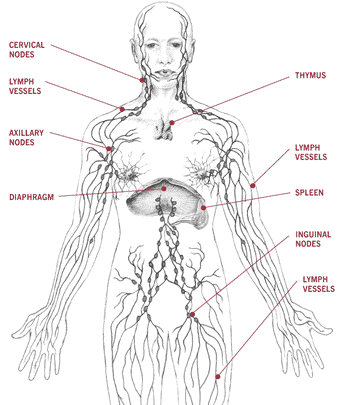What is the lymphatic system?
Your lymphatic system plays a big role in circulation and immune function.
Blood is pumped away from the heart through arteries and capillaries and circulates through your body.
Blood is pumped back to the heart through the veins, but a small amount of excess fluid and protein is left behind in the body tissues.
This excess of fluid is moved out of the tissues and back into the bloodstream by the lymphatic system.
The lymphatic system is a major component of your body’s immune system and helps to defend against disease.
The lymphatic system consists of lymph vessels and lymph nodes. Most of them are located just under the skin.
Lymph fluid is an almost clear liquid made up of protein, salts, water, and white blood cells.
Lymph fluid moves through the lymph vessels by muscular activity, by contraction of the vessels themselves, and by breathing.
When lymph vessels cannot transport lymph fluids back to circulation properly, swelling and thickening of the skin, usually in the limbs, can result. This build up of protein-rich fluid is known as lymphedema.

What is the role of the lymphatic system?
- Drain lymph fluid
- Transport & process lymph fluid
- Filter bacteria, viruses, dying cells, and waste products
- Remove excess lymph fluid from body tissues
What are lymph nodes?
Lymph nodes function as filters for toxins, proteins, bacteria, and other waste cells -especially when an immune reaction is necessary.
Lymph nodes are a small bean-shaped structures. There are about 600 – 700 lymph nodes in your body and are mainly located in groups along lymph vessels. The largest accumulations of lymph nodes are located in the neck, head, underarms, abdominal cavity, groin, pelvis, and chest. Some lymph nodes are close to the skin, while others are deeper in the body around major lymph vessels.
![Compass Therapeutic - White BG Logo Converted [web only]](https://www.compasstherapeutic.com/wp-content/uploads/2021/03/Compass-Therapeutic-White-BG-Logo-Converted-web-only-scaled.jpg)